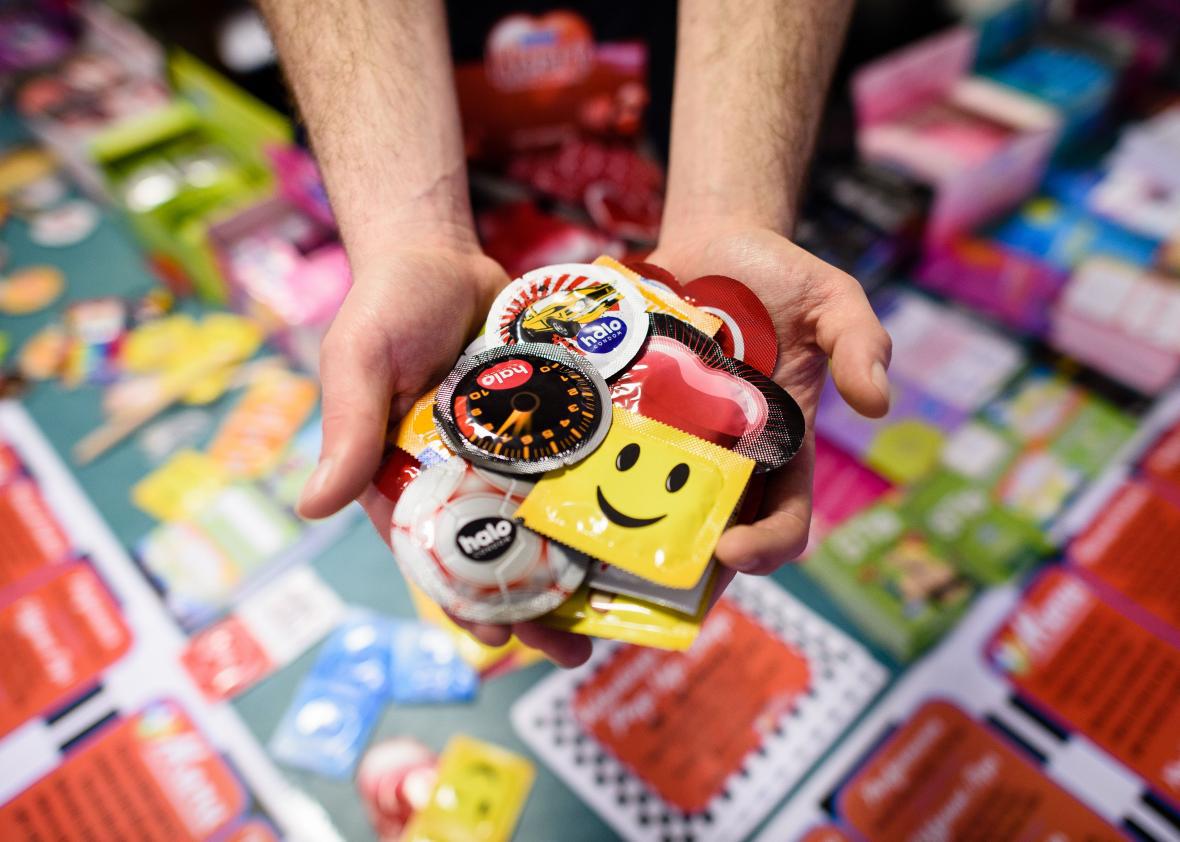Every other year, the Olympic Village—the complex that houses athletes, trainers, and officials for the duration of the games—doubles as a popup classroom in sex positivity. The world’s fittest people make infamously good use of their weeks in close proximity. Over the years, they’ve littered the rooftops of Seoul with used contraceptives, engaged in orgies in Vancouver hot tubs, flooded Tinder in Sochi, crashed Grindr in London, and been photographed in suggestive poses involving recently acquired medals and eager fans.
Through it all, tradition has held that host countries flood the village with condoms, encouraging Olympians to enjoy each other’s platonically ideal bodies in safety. Slate’s Holly Allen and Lakshmi Varanasi charted the history of latex at the games, from its origins in Seoul—where just 8,500 condoms were available—to a famous shortage in Sydney, which provided 70,000, only to rush in another 20,000 when the original batch ran out. The condom count hovered around 100,000 throughout most of the aughts. London set a record when it filled the Village with 150,000 Durex rubbers in 2012. But late last week, Rio de Janeiro reignited the latex arms race with the announcement that it will provide 450,000 condoms this August—100,000 female condoms, 350,000 male ones, and a bonus of 175,000 packets of lube.
It’s not entirely clear why Brazil felt the need to make its mark on Olympic history by provisioning what, as Quartz points out, works out to 42 condoms per athlete. The International Olympic Committee told Brazilian newspaper Folha de S.Paulo that the contraceptive cornucopia was in no way motivated by anxiety over the Zika virus—but those fears still provide one obvious explanation. Zika, which causes the severe birth defect microcephaly, can be transmitted sexually. The outbreak in Brazil—currently classified as a Level 2 alert by the U.S. government—has led some public health professionals to call for the postponement or relocation of the games. The Australian Olympic team has vowed to arrive with its own store of special antiviral condoms, though, as Kate Baggaley has written at Slate, those are probably neither more nor less effective against Zika than plain old rubbers. Blanketing Rio in contraceptives won’t protect people against the most common source of the virus—mosquito bites—but it could serve as a reminder to take extra precautions.
If Brazil’s triple-sized condom order is a roundabout way of expressing its vigilance on matters of public health, then that places it squarely within the tradition of contraceptives at the games. Starting with the 1992 Barcelona Olympics, the IOC has endorsed the practice as a way to raise awareness and prevent the spread of HIV/AIDS. In Beijing, the condoms came tucked inside informational brochures at Olympic Village medical centers. In Vancouver, the U.S. Curling Association sold its own prophylactics—embellished with a cartoon curler to distinguish them from the boatloads of free ones—and donated half the proceeds for AIDS prevention.
Even with the threat of Zika hanging over casual sexual encounters, Olympians may have trouble finding the time—and energy—to work their way through the bounty birth control in Rio. But that doesn’t mean Brazil’s generosity will go to waste. After the Vancouver Games in 2010, for example, Clay Adams of Vancouver Coastal Health—which distributed the prophylactics that year—told CNN that he heard stories about athletes from countries where condoms are less accessible, or lower quality, stuffing extras into their suitcases for later use. “When you’ve got a global audience like this, it’s a huge opportunity to educate the world,” he said. Though the Olympics’ show of global unity is always fraught, their relationship to sex is refreshingly frank. Despite the many questions about Rio’s readiness to host in August, in this one department, Brazil is prepared.
